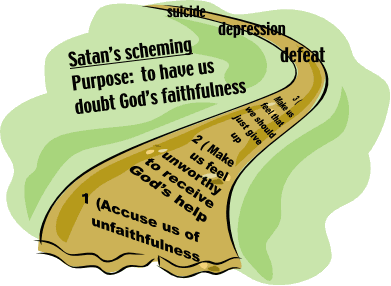

The Godly Man: Transformed by God's Faithfulness
God's Faithfulness Amidst Demonic Scheming
Paul J. Bucknell
Faith & Faithfulness | Hebrews 11 | Counterfeit Faith | Righteous live by Faith | God's Faithfulness | Words of Faith | Cultivating Faith | God's Extreme Faithfulness | Faithfulness in Temptation | Testimonies on Faithfulness
God's faithfulness is determined by God's own nature. It never had a beginning; He has always been faithful to His Word and purpose. God's faithfulness is not determined by the presence or lack of our faith. This is one of the old lies the evil one tries to use to get us to not trust in the Lord. How does the argument go? 
1) We are first accused of our unfaithfulness. This is true for the most part. The evil one is the Accuser. We can and should go to the point of confessing our sins to the Lord. But the evil one never wants this. He doesn't want humility or confession. He wants the evil thought to hang in our minds so that we despair. Because of this, He never brings just this one thought.
2) The devil and his agents also come and attempt to convince us that we are unworthy to receive His help and forgiveness. That of course is true too. We simply are not worthy of His help. That is the story of grace. He doesn't want acknowledge of God's grace but only to produce a sense of helplessness in our minds. So the devil never stops there. He hates that thought. He quickly moves on. By passing on a stream of thoughts quickly, we are unable to reflect the truths in light of the scriptures.
3) He then insultingly states, "Because you are unworthy of His help, then you should just give up." Usually this is combined with a number of other untruthful thoughts such as "God has given up on you." "You are no good." "Your sin shows you are not His anyway."
This demonic scheming is one of the ways Satan tries to have us question our faith and to give up. Have you been down this road?
 --- Purchase The Godly Man and its ten studies in easy epub or pdf format!
--- Purchase The Godly Man and its ten studies in easy epub or pdf format!
The Bait
What is the solution? The solution is to have the truth of God girded on. We need to write down each thought and acknowledge it. Remember the devil will give you enough truth to make you think it is God speaking. But he will invariably begin invoking false statements. When we discover a true statement such as "We have messed up again" or that "We do not deserve God's help." We should really agree with these statements because they are fully true. We have failed God. We do not deserve His goodness expressed to us. This is what grace and salvation is all about. However, the next part is tricky and where we most often get snared.
The Hook
Satan inputs into our minds some wrong thoughts. We might think of it like this. The evil one does not want us to think of God's faithfulness. So he tries to control our conclusion. Let me give you an example or two.
• You have failed again so you may as well give up.
• You do not deserve God's help, so you may as well as find help elsewhere.
Then he will compound this falsehood with defeatist thoughts that end in self pity and confussion. If we do not catch our thoughts, we will run into depression. Suicide is the giving up of all hope and finding 'escape' better than facing that dark despair.
What are some of these defeatest thoughts?
• You are no good.
• You may as well give up.
• You will never be any good.
• You messed up again (meaning that is just like you).
• God has given up on you.
• If God treats you this way, well you may as find someone else to trust!
• God isn't faithful. He didn't help you out.
One might wonder about why in a discussion of faith that we need to discuss the tactics of the evil one. The reason is to prevent the evil one from giving us the wrong interpretation of our weaknesses and failures with regard to God's faithfulness. God's faithfulness is a powerful truth that we can bring to our confused minds at any time. God is faithful to us even in our sin.
"It is a trustworthy statement:
For if we died with Him, we shall also live with Him;
If we endure, we shall also reign with Him;
If we deny Him, He also will deny us;
If we are faithless, He remains faithful;
for He cannot deny Himself."
2 Timothy 2:11-13, NASB.
The issue is not whether we will at times be faithless. We confess this. The gospel is built upon two truths regarding our weaknesses and sins:
• We are sinners and therefore sin.
• We are saved by grace alone, not by our own righteousness.
God's faithfulness is seen in spite of these blatant failures of ours. As Paul says in Romans 3:3,
What then? If some did not believe, their unbelief will not nullify the faithfulness of God, will it?
May it never be! Rather, let God be found true, though every man be found a liar, as it is written, "THAT THOU MIGHTEST BE JUSTIFIED IN THY WORDS, AND MIGHTEST PREVAIL WHEN THOU ART JUDGED."
We must never doubt God's faithfulness in expressing His love and grace toward us sinners. God cannot deny His own nature. His promises are true. His dealings with us will always be faithful and consistent. If we can embed this truth into our very souls and minds, then we have half the battle fought. From that point on we will not need to question God's faithfulness, but instead to always humble ourselves in our faithlessness.
Note the theme of faithless men in the book of Jeremiah.
The Faithful God and His Faithless People
A Short Study in JeremiahJeremiah 3:6 Then the LORD said to me in the days of Josiah the king, "Have you seen what faithless Israel did? She went up on every high hill and under every green tree, and she was a harlot there. The faithless people of God. Jeremiah 3:8 "And I saw that for all the adulteries of faithless Israel, I had sent her away and given her a writ of divorce, yet her treacherous sister Judah did not fear; but she went and was a harlot also.
The faithless people of God. Jeremiah 3:11 And the LORD said to me, "Faithless Israel has proved herself more righteous than treacherous Judah.
The faithless people of God. Jeremiah 3:14 ‘Return, O faithless sons,’ declares the LORD; ‘For I am a master to you, And I will take you one from a city and two from a family, And I will bring you to Zion.’
The faithful God calls the failthless to return to Him. Jeremiah 3:22 "Return, O faithless sons, I will heal your faithlessness.” "Behold, we come to Thee; For Thou art the LORD our God.
The faithful God calls the failthless to return to Him. Jeremiah 31:22 "How long will you go here and there, O faithless daughter? For the LORD has created a new thing in the earth-- A woman will encompass a man.”
The faithful God calls the failthless to return to Him.
Conclusion
Jeremiah only highlights what is written throughout the scriptures. God does not point out our sin to make us feel condemned but to call ourselves back to Himself. God loves us in spite of our sins. His grace is abundant even in our unfaithfulness.
And yet the warning remains, if we presume upon His faithful treatment, then it will not be available for us. His grace is not there for those who confide themselves in His grace and yet never change. No. God's grace is there for the sinner who acknowledges and turns from his sins. The confusion perhaps comes from the word faithless describing two kinds of people: those that have fallen because a lack of faith in God, and those that have fallen and still do not believe. God calls out for us to return, but only those who come will find help in their time of need.
info@foundationsforfreedom.net
Scriptures typically quoted from the New American Standard Bible unless noted:
(C) Copyright The Lockman Foundation 1988









